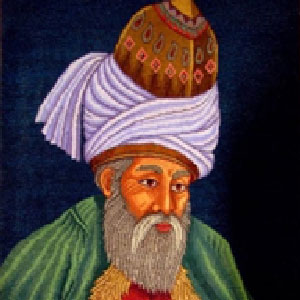
About Jallaudin Rumi
Jalaluddin Rumi (1207 A.D-1273 A.D.), the Persian poet, has been called the greatest mystical poet of all time. Rumi deals with the human condition and that is always relevant.
Influences on Rumi
- Rumi does not offend anyone and he includes everyone. The world of Rumi is neither exclusively the world of a Sufi, nor the world of a Hindu, nor a Jew, nor a Christian; it is a state of an evolved human.
- Buddhist and Zoroastrian religion influences were also present in the area, which had a great influence on his work
- Rumi was not bound by cultural limitations; he touched everyone with his verses. Today Rumi's poems can be heard in various places of worship like churches, synagogues, Zen monasteries, as well as in art performance/music scene.
- Rumi also writes about the abolishment of the established fear-based religious orders of the world.
- For Rumi fear-based religion is poison and his remedy is love-based doctrine--a life journey free of guilt, fear and shame.
- During the last 25 years of his life, Rumi over 70,000 verses of poetry collected in 2 distinct volumes. Poetry focusing on varied and diverse topics.
- His work covers deeply philosophical and mystical, with poems of fiery soulful expression to passionate love verses filled with yearning and desire in volume 1.
- In his second volume, which is his populist work, he switches to a work filled with anecdotes, life lessons, moral stories, stories from all three Abrahamic religions, popular topics of the day and even satirical tales.
- Muhammad Iqbal, the renowned 20th century philosopher, poet and politician of the Indian Subcontinent, was also immensely inspired by the teachings of Maulana Rumi.
- The famous long Urdu poem by Iqbal is titled “Sage Rumi and Indian Disciple” which consists of an interesting dialogue between Iqbal and Rumi.
Rumi’s Influence in Medieval Era
"In India, the love of Maulana Rumi was by no means restricted to the Sufi Orders. We may say without exaggeration that the Masnavi was accepted as authoritative throughout medieval India.
- The Emperor Akbar (ruled 1556-1605) loved the Masnavi,
- the poet Sheyda at Shah Jehan's court (ruled 1627-1658) 'quoted in self-defense the authority of Maulana Rumi' and was released.
- The heir apparent of the Mughal Empire, Shah Jehan's son, Dara Shikoh (d. 1659) was a great admirer of Rumi, so much so that he copied a Masnavi of Rumi with his own hand.
- Dara's younger brother Aurangzeb (ruled 1658-1707), who persecuted and eventually executed him, was likewise fond of Rumi's poetry to such an extent that his theological instructor, Maula Jivan, composed an interpretation of the Masnavi.


